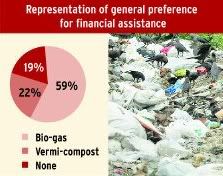Community biogas plants preferred waste management option amongst citizens of Kochi, India
 Highlighting the need to decentralise solid waste management, a study conducted by the SCMS Group's Centre for Socio-Economic Research in Kochi, a city of 1.5 million in India's southern Kerala state, found that the majority of respondents in the city preferred setting up community biogas plants for waste treatment.
Highlighting the need to decentralise solid waste management, a study conducted by the SCMS Group's Centre for Socio-Economic Research in Kochi, a city of 1.5 million in India's southern Kerala state, found that the majority of respondents in the city preferred setting up community biogas plants for waste treatment.Waste management is a huge problem in most of the developing world's rapidly growing cities. A lack of waste treatment technologies and policies often results in a very tangible health risk to the population. Organising integrated waste management requires an insight into how people deal with household waste. Researchers from the SCMS therefor conducted their survey, with the objective to analyse the best financial support and intervention strategies, and to see how different social classes should be approached. Other developing world cities could benefit from similar social science approaches to discover how waste management should be organised most effectively (also have a look at the enormous waste problem in Africa's second largest city, Kinshasa, and its choice for biogas - earlier post).
The basic survey was conducted in 832 households in 15 wards. The areas included Elamakkara North, Thrikkanarvattom, Karukappilli, Kaloor South, Kathrikadavu, Elamkulam, Thammanam, Kadavanthra, Vaduthala East, Puthukkalavattom, Edapally, Devankulangara, Vennala, Chalikkavattom and Thevara (map, click to enlarge).
We should take into account the minute details of the waste management problem in order to solve it - A. P. M. Mohammed Hanish, Kochi District Collector
 It was found that 488 households preferred biogas plants while 186 voted for vermi-compost units. Interestingly, 19 per cent of the respondents said that they did not want assistance for installation of biogas or vermi-compost units, said Radha Thevannoor, project co-ordinator and director of the SCMS School of Technology and Management.
It was found that 488 households preferred biogas plants while 186 voted for vermi-compost units. Interestingly, 19 per cent of the respondents said that they did not want assistance for installation of biogas or vermi-compost units, said Radha Thevannoor, project co-ordinator and director of the SCMS School of Technology and Management.Preference for biogas plant installation was found high among people in the income category of Rs 5,000 (€89/$126) and below and those in the category between Rs5,000 and Rs15,000.
The low income group seems to be more practical in the case of waste management. [...] Many of the people whom we approached were of the opinion that it is the government's responsibility to manage the segregation and disposal of waste. Some of them were not even ready to consider the segregation of waste at home - Poornima Narayan and N. Rajagopal, Centre for Socio-Economic ResearchPointing towards the public perception on the feasibility of various intervention strategies on waste disposal, Thevannoor said that the majority preferred financial aid rather than technical help from the part of the Government.
Moreover, it was found that 80.5 per cent of the total respondents preferred common facilities than individual ones. The responses in favor of communal biogas plants were high among all the income categories:
 sustainability :: social sciences :: waste management :: biomass :: biogas :: anaerobic digestion :: energy :: India ::
sustainability :: social sciences :: waste management :: biomass :: biogas :: anaerobic digestion :: energy :: India :: N. Rajagopal and Poornima Narayan, research team members, said that 45.9 per cent respondents depended on organised groups for waste disposal while 27.6 per cent dumped the waste in Corporation bins.
The study found that waste generated from organic matter/ vegetables constituted 31 percent of the total waste followed by garden waste with 20 percent. Plastic and rubber constituted 12 per cent of the total waste.
The researchers observed that there was no system of separating organic, inorganic and recyclable waste at the household level.
Residents also supported Kudumbasree units engaged in waste collection. Lack of space for setting up bio-gas plants was found in apartments in the city.
Recommending that financial intervention strategies on waste management should be primarily targeted at middle and lower income categories, the team suggested setting up model community biogas plants in areas coming under the Kochi Corporation, which is responsible for waste treatment.
References:
Newindpress: Community biogas plants mooted - September 25, 2007
Newindpress: Project report on waste management submitted - September 25, 2007
The Hindu: Study finds preference for biogas plants - September 25, 2007.
 --------------
--------------
 According to Tarja Halonen, the Finnish president, one third of the value of all of Finland's exports consists of environmentally friendly technologies. Finland has invested in climate and energy technologies, particularly in combined heat and power production from biomass, bioenergy and wind power, the president said at the UN secretary-general's high-level event on climate change.
According to Tarja Halonen, the Finnish president, one third of the value of all of Finland's exports consists of environmentally friendly technologies. Finland has invested in climate and energy technologies, particularly in combined heat and power production from biomass, bioenergy and wind power, the president said at the UN secretary-general's high-level event on climate change.








0 Comments:
Post a Comment
Links to this post:
Create a Link
<< Home